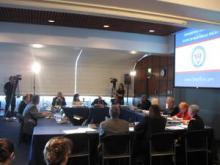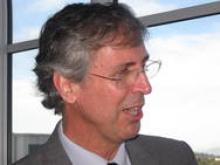Human genome sequencing. Facebook. Informed consent. “The Lion, the Witch and the Wardrobe.” Rare diseases. “Hotel California.” Cost-effective medicine.
It was all in a day’s work for the Presidential Commission for the Study of Bioethical Issues in its eighth meeting, this time at the University of California, San Francisco. The focus: What policies or programs should be in place (if any) to guide the ethical use of human genome sequencing, a kind of testing that’s positioned to explode into widespread use.
The cost of sequencing one person’s genome has shrunk from nearly $3 billion a mere 14 years ago to an anticipated $1,000 within the next year or two, Richard A. Gibbs, Ph.D. told the Commission. He and other experts testified in preparation for the Commission’s third report as advisors to the President. (See previous reports on separate topics here).
Today, physicians can order human genome sequencing at a handful of specialized centers. Approximately 10,000 humans had their genomes sequenced in 2011. Perhaps 100,000 will do the same in 2012, estimated Dr. Gibbs, director of the Human Genome Sequencing Center at Baylor College. He disclosed being an investor in Life Technology and co-founder of the company Seq-Wright.
Researchers and families with genetic diseases are salivating at the possibility of access to the gold mine of data this could provide, potentially improving diagnoses, identifying unknown causes of diseases, and helping people and their physicians know which drugs they will or won’t respond to, among other possible benefits.
Retta Beery is one example – she described the agonizing journey of her twins, Alexis and Noah, to a correct diagnosis of their rare but treatable genetic condition. After years of extremely limited mobility, severe breathing problems, costly ER visits, imaging tests, visits to specialists, and more, genome sequencing at Dr. Gibbs’ Center identified mutations in a gene called SPR that encodes the enzyme sepiapterin reductase. With proper treatment, the twins are healthy and high-functioning teenagers today, as Ms. Beery chronicles on a website she started to support other families with similar challenges.
Scientists are in the infant stages of understanding all the data that genome sequencing produces, however. “The good news is we have the human genome. The bad news is it’s largely just a parts list,” said Dr. Daniel Masys of the University of Washington. “Our ability to acquire person-specific DNA data far exceeds our understanding of its meaning.”
Learning how to “read” genomes will require sophisticated studies of vast amounts of data from millions of people, a scale of research never seen before, he said. Limiting access to genome data could stifle the many discoveries sure to be made by this work.
Meanwhile, who will be interpreting genome data? How will patients understand the potential risks and benefits of making their genome data available to others? Can the data ever be safely protected in today’s interconnected world? Every human has multiple genetic variations, and “worried well” patients could bankrupt the medical system by demanding tests or cures for things that may not really be a problem.
“There’s a snake oil salesman out there for everything,” said Commission Chair Amy Gutmann, Ph.D., president of the University of Pennsylvania.
Several speakers cautioned that it may be impossible to prevent someone from connecting even “protected” genome sequencing data to an individual and using that for commercial purposes or to limit access to insurance or health care.
“I don’t think we’re ready for this huge onslaught of additional information, because there’s too much opportunity for misuse,” said Mark A. Rothstein, J.D., chair of law and medicine at the University of Louisville.
Given the concerns about privacy, it was only a matter of time before Facebook analogies became part of the discussion. “The privacy settings are set so you don’t have any,” and users must “crank down” the settings to establish any privacy on Facebook, said Jane Kaye, D.Phil, director of the Centre for Law, Health and Emerging Technologies at the University of Oxford, U.K. “I don’t think we want to be in a society which is like that.”
Privacy should be a right in human society with ways for people to crank down their privacy limits if they want to share their information, she said. Finding mechanisms to ensure that would protect all people, not just people who are able to make decisions on their own behalf.
The future of digital information will be networks within networks of information, she predicted. Opening one “portal” may give access to information that you didn’t even know was there, like the portal between worlds in C.S. Lewis’ book, “The Lion, the Witch and the Wardrobe,” Dr. Kaye said.



